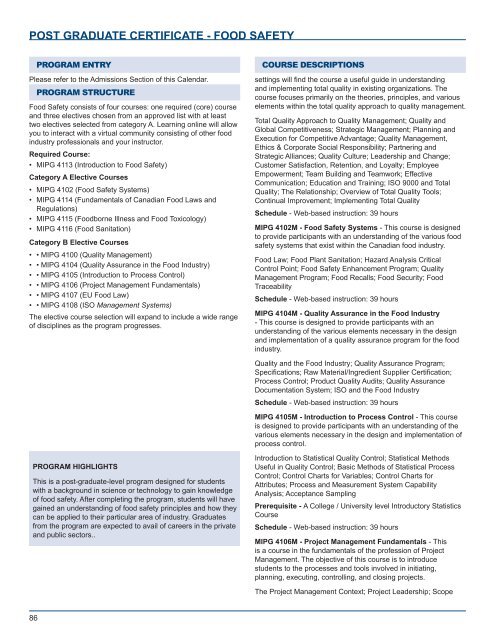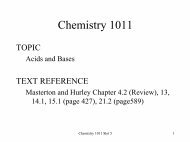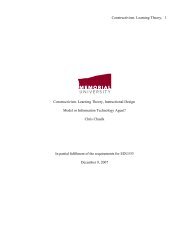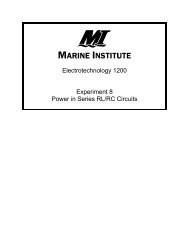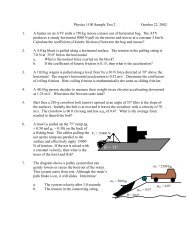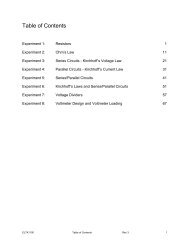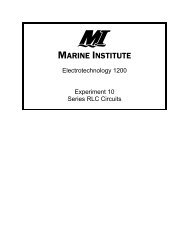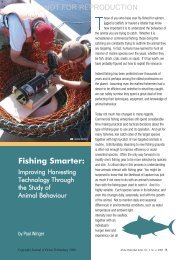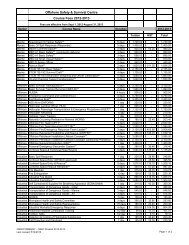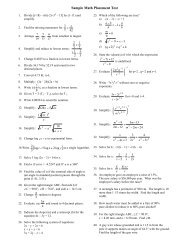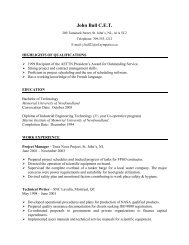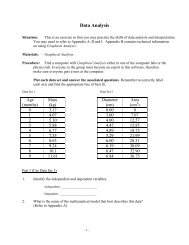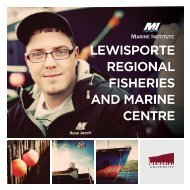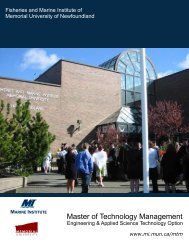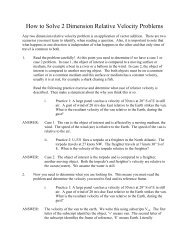Academic Calendar - Fisheries and Marine Institute - Memorial ...
Academic Calendar - Fisheries and Marine Institute - Memorial ...
Academic Calendar - Fisheries and Marine Institute - Memorial ...
You also want an ePaper? Increase the reach of your titles
YUMPU automatically turns print PDFs into web optimized ePapers that Google loves.
POST GRADUATE CERTIFICATE - FOOD SAFETY<br />
PROGRAM ENTRY<br />
Please refer to the Admissions Section of this <strong>Calendar</strong>.<br />
PROGRAM STRUCTURE<br />
Food Safety consists of four courses: one required (core) course<br />
<strong>and</strong> three electives chosen from an approved list with at least<br />
two electives selected from category A. Learning online will allow<br />
you to interact with a virtual community consisting of other food<br />
industry professionals <strong>and</strong> your instructor.<br />
Required Course:<br />
• MIPG 4113 (Introduction to Food Safety)<br />
Category A Elective Courses<br />
• MIPG 4102 (Food Safety Systems)<br />
• MIPG 4114 (Fundamentals of Canadian Food Laws <strong>and</strong><br />
Regulations)<br />
• MIPG 4115 (Foodborne Illness <strong>and</strong> Food Toxicology)<br />
• MIPG 4116 (Food Sanitation)<br />
Category B Elective Courses<br />
• • MIPG 4100 (Quality Management)<br />
• • MIPG 4104 (Quality Assurance in the Food Industry)<br />
• • MIPG 4105 (Introduction to Process Control)<br />
• • MIPG 4106 (Project Management Fundamentals)<br />
• • MIPG 4107 (EU Food Law)<br />
• • MIPG 4108 (ISO Management Systems)<br />
The elective course selection will exp<strong>and</strong> to include a wide range<br />
of disciplines as the program progresses.<br />
COURSE DESCRIPTIONS<br />
settings will find the course a useful guide in underst<strong>and</strong>ing<br />
<strong>and</strong> implementing total quality in existing organizations. The<br />
course focuses primarily on the theories, principles, <strong>and</strong> various<br />
elements within the total quality approach to quality management.<br />
Total Quality Approach to Quality Management; Quality <strong>and</strong><br />
Global Competitiveness; Strategic Management; Planning <strong>and</strong><br />
Execution for Competitive Advantage; Quality Management,<br />
Ethics & Corporate Social Responsibility; Partnering <strong>and</strong><br />
Strategic Alliances; Quality Culture; Leadership <strong>and</strong> Change;<br />
Customer Satisfaction, Retention, <strong>and</strong> Loyalty; Employee<br />
Empowerment; Team Building <strong>and</strong> Teamwork; Effective<br />
Communication; Education <strong>and</strong> Training; ISO 9000 <strong>and</strong> Total<br />
Quality; The Relationship; Overview of Total Quality Tools;<br />
Continual Improvement; Implementing Total Quality<br />
Schedule - Web-based instruction: 39 hours<br />
MIPG 4102M - Food Safety Systems - This course is designed<br />
to provide participants with an underst<strong>and</strong>ing of the various food<br />
safety systems that exist within the Canadian food industry.<br />
Food Law; Food Plant Sanitation; Hazard Analysis Critical<br />
Control Point; Food Safety Enhancement Program; Quality<br />
Management Program; Food Recalls; Food Security; Food<br />
Traceability<br />
Schedule - Web-based instruction: 39 hours<br />
MIPG 4104M - Quality Assurance in the Food Industry<br />
- This course is designed to provide participants with an<br />
underst<strong>and</strong>ing of the various elements necessary in the design<br />
<strong>and</strong> implementation of a quality assurance program for the food<br />
industry.<br />
Quality <strong>and</strong> the Food Industry; Quality Assurance Program;<br />
Specifications; Raw Material/Ingredient Supplier Certification;<br />
Process Control; Product Quality Audits; Quality Assurance<br />
Documentation System; ISO <strong>and</strong> the Food Industry<br />
Schedule - Web-based instruction: 39 hours<br />
MIPG 4105M - Introduction to Process Control - This course<br />
is designed to provide participants with an underst<strong>and</strong>ing of the<br />
various elements necessary in the design <strong>and</strong> implementation of<br />
process control.<br />
PROGRAM HIGHLIGHTS<br />
This is a post-graduate-level program designed for students<br />
with a background in science or technology to gain knowledge<br />
of food safety. After completing the program, students will have<br />
gained an underst<strong>and</strong>ing of food safety principles <strong>and</strong> how they<br />
can be applied to their particular area of industry. Graduates<br />
from the program are expected to avail of careers in the private<br />
<strong>and</strong> public sectors..<br />
Introduction to Statistical Quality Control; Statistical Methods<br />
Useful in Quality Control; Basic Methods of Statistical Process<br />
Control; Control Charts for Variables; Control Charts for<br />
Attributes; Process <strong>and</strong> Measurement System Capability<br />
Analysis; Acceptance Sampling<br />
Prerequisite - A College / University level Introductory Statistics<br />
Course<br />
Schedule - Web-based instruction: 39 hours<br />
MIPG 4106M - Project Management Fundamentals - This<br />
is a course in the fundamentals of the profession of Project<br />
Management. The objective of this course is to introduce<br />
students to the processes <strong>and</strong> tools involved in initiating,<br />
planning, executing, controlling, <strong>and</strong> closing projects.<br />
The Project Management Context; Project Leadership; Scope<br />
86


